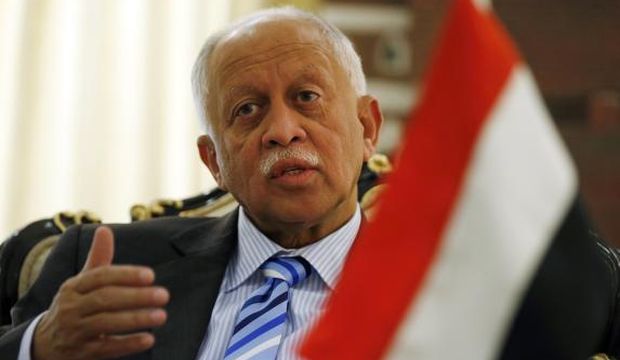
A picture taken on April 1, 2015 shows Yemen’s Foreign Minister Riyadh Yassin talking to the press at the Yemeni embassy in the Saudi capital Riyadh. (AFP Photo/Stringer)
London, Asharq Al-Awsat—The legitimate Yemeni government led by internationally recognized President Abd Rabbuh Mansur Hadi is preparing a report to present to the United Nations detailing former president Ali Abdullah Saleh’s involvement with terror groups such as Al-Qaeda, the country’s foreign minister said on Sunday.
Speaking at a press conference in London, Riyadh Yassin said Saleh had for years capitalized on the threat of Al-Qaeda’s franchise in Yemen, Al-Qaeda in the Arabian Peninsula (AQAP), in order to stay in power, and “benefited from them by taking advantage of other countries such as the United States and others who were concerned about the threat” posed by the group.
“All of these [extremist] groups [in Yemen] received support from Saleh, and we have amassed evidence [proving this] which we will present to the United Nations,” he added.
Yassin said the government remained “extremely worried about [AQAP] capitalizing on the current state of chaos in Yemen” but dismissed claims by the Iran-backed Shi’ite Houthi movement that the Islamic State of Iraq and Syria (ISIS) had entered the country, claiming this was a ploy by the Houthis to attempt to spread their militias throughout Yemen.
“Of course, they [the Houthis] will always claim they are fighting ISIS, but this is not true,” he said.
The Houthi movement launched a coup in Yemen in February, forming a committee to choose a new cabinet and an interim presidential council to govern the country’s affairs in the absence of President Hadi, who at the time was under Houthi-imposed house arrest in the capital Sana’a.
Both Saleh and Iran have been accused by Yemen’s government, Saudi Arabia, its Arab allies, and the UN of allying with the Houthis and helping orchestrate their militias’ advance across Yemen, which began in September of 2014 after the movement took over government buildings and military installations in Sana’a.
Cadres within the country’s military and security establishments loyal to Saleh are said to have deliberately withdrawn from their posts to help the Houthi advance, after allegedly receiving orders from the former president, who was ousted in 2012 following mass protests against his more than three decade rule.
Recent events suggest however that cracks are appearing in the relationship between Saleh and the Houthis. The former president called on the movement last week to withdraw from all areas of Yemen it has occupied and return to the negotiating table, in line with the recent UN Security Council Resolution 2216.
Commenting on Saleh’s relationship with the Shi’ite group, Yassin said: “There is a clear rift between the Houthis and Saleh . . . He put them in this [position] and has tried to escape the country via any means.”
Yemeni sources told Asharq Al-Awsat on Saturday Saleh attempted to leave the country in a military aircraft just days ago, but was stopped due to the blockade of Yemeni airspace enforced by the Saudi-led anti-Houthi coalition.
Recent airstrikes by the coalition began in March after Hadi traveled to Riyadh to request military intervention to protect the legitimate political authority in the country.
The almost-four-week campaign, known as Operation Decisive Storm, ended last week, but the Saudi-led coalition has always maintained strikes could restart if the Houthis continue their transgressions against the Yemeni people.
Yassin warned of the continued Houthi threat to the stability of the country, and called on the coalition to continue targeting the group.
“Operation Decisive Storm has not ended . . . There will be no cooperation with the Houthis of any kind until they withdraw from areas under their control,” he said.
“Various measures began with the strikes but they could be followed up in other ways, including the introduction of ground troops . . . This could happen in safe areas . . . and there is no need for the coalition to spread its troops throughout Yemen, because 70 percent of the country is not under Houthi control.”
